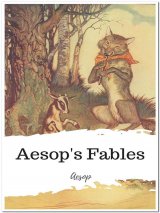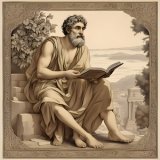Aesop's Fables Page #14
Aesop's Fables, or the Aesopica, is a collection of fables credited to Aesop, a slave and storyteller believed to have lived in ancient Greece between 620 and 564 BCE.
THE TUNNY-FISH AND THE DOLPHIN A Tunny-fish was chased by a Dolphin and splashed through the water at a great rate, but the Dolphin gradually gained upon him, and was just about to seize him when the force of his flight carried the Tunny on to a sandbank. In the heat of the chase the Dolphin followed him, and there they both lay out of the water, gasping for dear life. When the Tunny saw that his enemy was doomed like himself, he said, "I don't mind having to die now: for I see that he who is the cause of my death is about to share the same fate." THE THREE TRADESMEN The citizens of a certain city were debating about the best material to use in the fortifications which were about to be erected for the greater security of the town. A Carpenter got up and advised the use of wood, which he said was readily procurable and easily worked. A Stone-mason objected to wood on the ground that it was so inflammable, and recommended stones instead. Then a Tanner got on his legs and said, "In my opinion there's nothing like leather." Every man for himself. THE MOUSE AND THE BULL A Bull gave chase to a Mouse which had bitten him in the nose: but the Mouse was too quick for him and slipped into a hole in a wall. The Bull charged furiously into the wall again and again until he was tired out, and sank down on the ground exhausted with his efforts. When all was quiet, the Mouse darted out and bit him again. Beside himself with rage he started to his feet, but by that time the Mouse was back in his hole again, and he could do nothing but bellow and fume in helpless anger. Presently he heard a shrill little voice say from inside the wall, "You big fellows don't always have it your own way, you see: sometimes we little ones come off best." The battle is not always to the strong. THE HARE AND THE HOUND A Hound started a Hare from her form, and pursued her for some distance; but as she gradually gained upon him, he gave up the chase. A rustic who had seen the race met the Hound as he was returning, and taunted him with his defeat. "The little one was too much for you," said he. "Ah, well," said the Hound, "don't forget it's one thing to be running for your dinner, but quite another to be running for your life." THE TOWN MOUSE AND THE COUNTRY MOUSE A Town Mouse and a Country Mouse were acquaintances, and the Country Mouse one day invited his friend to come and see him at his home in the fields. The Town Mouse came, and they sat down to a dinner of barleycorns and roots, the latter of which had a distinctly earthy flavour. The fare was not much to the taste of the guest, and presently he broke out with "My poor dear friend, you live here no better than the ants. Now, you should just see how I fare! My larder is a regular horn of plenty. You must come and stay with me, and I promise you you shall live on the fat of the land." So when he returned to town he took the Country Mouse with him, and showed him into a larder containing flour and oatmeal and figs and honey and dates. The Country Mouse had never seen anything like it, and sat down to enjoy the luxuries his friend provided: but before they had well begun, the door of the larder opened and some one came in. The two Mice scampered off and hid themselves in a narrow and exceedingly uncomfortable hole. Presently, when all was quiet, they ventured out again; but some one else came in, and off they scuttled again. This was too much for the visitor. "Good-bye," said he, "I'm off. You live in the lap of luxury, I can see, but you are surrounded by dangers; whereas at home I can enjoy my simple dinner of roots and corn in peace." THE LION AND THE BULL A Lion saw a fine fat Bull pasturing among a herd of cattle and cast about for some means of getting him into his clutches; so he sent him word that he was sacrificing a sheep, and asked if he would do him the honour of dining with him. The Bull accepted the invitation, but, on arriving at the Lion's den, he saw a great array of saucepans and spits, but no sign of a sheep; so he turned on his heel and walked quietly away. The Lion called after him in an injured tone to ask the reason, and the Bull turned round and said, "I have reason enough. When I saw all your preparations it struck me at once that the victim was to be a Bull and not a sheep." The net is spread in vain in sight of the bird. THE WOLF, THE FOX, AND THE APE A Wolf charged a Fox with theft, which he denied, and the case was brought before an Ape to be tried. When he had heard the evidence on both sides, the Ape gave judgment as follows: "I do not think," he said, "that you, O Wolf, ever lost what you claim; but all the same I believe that you, Fox, are guilty of the theft, in spite of all your denials." The dishonest get no credit, even if they act honestly. THE EAGLE AND THE COCKS There were two Cocks in the same farmyard, and they fought to decide who should be master. When the fight was over, the beaten one went and hid himself in a dark corner; while the victor flew up on to the roof of the stables and crowed lustily. But an Eagle espied him from high up in the sky, and swooped down and carried him off. Forthwith the other Cock came out of his corner and ruled the roost without a rival. Pride comes before a fall. THE ESCAPED JACKDAW A Man caught a Jackdaw and tied a piece of string to one of its legs, and then gave it to his children for a pet. But the Jackdaw didn't at all like having to live with people; so, after a while, when he seemed to have become fairly tame and they didn't watch him so closely, he slipped away and flew back to his old haunts. Unfortunately, the string was still on his leg, and before long it got entangled in the branches of a tree and the Jackdaw couldn't get free, try as he would. He saw it was all up with him, and cried in despair, "Alas, in gaining my freedom I have lost my life." THE FARMER AND THE FOX A Farmer was greatly annoyed by a Fox, which came prowling about his yard at night and carried off his fowls. So he set a trap for him and caught him; and in order to be revenged upon him, he tied a bunch of tow to his tail and set fire to it and let him go. As ill-luck would have it, however, the Fox made straight for the fields where the corn was standing ripe and ready for cutting. It quickly caught fire and was all burnt up, and the Farmer lost all his harvest. Revenge is a two-edged sword. VENUS AND THE CAT A Cat fell in love with a handsome young man, and begged the goddess Venus to change her into a woman. Venus was very gracious about it, and changed her at once into a beautiful maiden, whom the young man fell in love with at first sight and shortly afterwards married. One day Venus thought she would like to see whether the Cat had changed her habits as well as her form; so she let a mouse run loose in the room where they were. Forgetting everything, the young woman had no sooner seen the mouse than up she jumped and was after it like a shot: at which the goddess was so disgusted that she changed her back again into a Cat.
Translation
Translate and read this book in other languages:
Select another language:
- - Select -
- 简体中文 (Chinese - Simplified)
- 繁體中文 (Chinese - Traditional)
- Español (Spanish)
- Esperanto (Esperanto)
- 日本語 (Japanese)
- Português (Portuguese)
- Deutsch (German)
- العربية (Arabic)
- Français (French)
- Русский (Russian)
- ಕನ್ನಡ (Kannada)
- 한국어 (Korean)
- עברית (Hebrew)
- Gaeilge (Irish)
- Українська (Ukrainian)
- اردو (Urdu)
- Magyar (Hungarian)
- मानक हिन्दी (Hindi)
- Indonesia (Indonesian)
- Italiano (Italian)
- தமிழ் (Tamil)
- Türkçe (Turkish)
- తెలుగు (Telugu)
- ภาษาไทย (Thai)
- Tiếng Việt (Vietnamese)
- Čeština (Czech)
- Polski (Polish)
- Bahasa Indonesia (Indonesian)
- Românește (Romanian)
- Nederlands (Dutch)
- Ελληνικά (Greek)
- Latinum (Latin)
- Svenska (Swedish)
- Dansk (Danish)
- Suomi (Finnish)
- فارسی (Persian)
- ייִדיש (Yiddish)
- հայերեն (Armenian)
- Norsk (Norwegian)
- English (English)
Citation
Use the citation below to add this book to your bibliography:
Style:MLAChicagoAPA
"Aesop's Fables Books." Literature.com. STANDS4 LLC, 2025. Web. 10 Jan. 2025. <https://www.literature.com/book/aesop%27s_fables_316>.




Discuss this Aesop's Fables book with the community:
Report Comment
We're doing our best to make sure our content is useful, accurate and safe.
If by any chance you spot an inappropriate comment while navigating through our website please use this form to let us know, and we'll take care of it shortly.
Attachment
You need to be logged in to favorite.
Log In